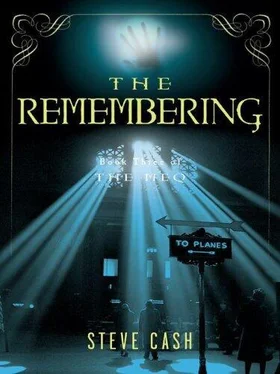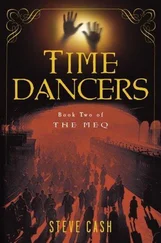Geaxi and West returned to live on the south coast of Wales at Morgan Manor. Two years after Nova, when Geaxi turned nineteen, she also gave birth to a baby girl after being in labor for thirty-three hours. It was a trying and traumatic experience, but Geaxi never complained. She told me, “It was no worse than playing chess with you, young Zezen.” The baby was named Iza, the Meq word for “first,” because Geaxi said she was the first of a new species of Meq.
Sailor and Sheela settled in Cairo, living with a wealthy family of traders Sailor had known and trusted for centuries. Mowsel and Zeru-Meq lived with them for a few years, then left suddenly, heading in separate directions, Mowsel going west and Zeru-Meq going east. Both of them had no fixed plans and were not intent on arriving anywhere in particular. In the late spring of 1988, Sailor and Sheela had their baby, a beautiful boy with sharp features and dark skin. He was given the formal name of Zubi-Meq, but Sailor called him Jack.
The following year Opari and I stopped in Cairo for a visit and to see the baby. It was bizarre to see Sailor as a young man. He and Sheela were twenty-two years old and looked just like any other young, modern, handsome couple. It was also odd to be so much smaller than Sailor. However, the most surreal moment of the visit was an act that is completely common and mundane, but something I never thought I’d witness. Early one morning I happened to see Sailor shaving.
Before we left, I asked about the Fleur-du-Mal and Fielder. Sailor said he thought they were living somewhere in the United States, but no one knew their exact location, or if they had a child.
In 1990, six months after the accident, Opari and I received the tragic news that Koldo and Arrosa had been killed in a car wreck in Cornwall. We had missed the funeral, so we sent our condolences and best wishes in a letter to Kepa and Yaldi.
For the next ten years, as Opari and I continued to travel, I called St. Louis on a regular basis. Except for the usual aches and pains of old age, Star, Antoinette, and Caine remained healthy. Georgie had moved back from California with her border collie, Carolina, and was now running the household and taking care of her parents and Star when they needed it. Then, on New Year’s Eve, December 31, 1999, Star died peacefully in her sleep. She was ninety-nine years old. Three years later, Caine suffered a massive stroke at the age of eighty-four. At the moment of his death, he was writing a book on his theory of the origins of the Basque language. He was in midsentence when the stroke hit, and Antoinette said the pen was still in his hand when she found him. His death must have been difficult for her because afterward her own health began to deteriorate rapidly. Six months after Caine, she developed pneumonia and never recovered. Georgie said she passed away on February 1, 2003. She was seventy-six years old.
Opari and I kept moving. Year to year, country to country, continent to continent, avoiding war zones and tourists with equal disdain, we kept to ourselves and we kept moving. Traveling without the Stones was a new experience for both of us. Many times in potentially dangerous situations, I unconsciously reached in my pocket for the Stone that was no longer there, and it wasn’t until 2012 that I finally broke the habit. That year we were in Argentina, and we crisscrossed South America for two more years, then followed the sun and headed west, stopping to live in the middle of the Pacific on the Marquesas Islands for another year.
By 2016 we were living in Australia, where we spent a year wandering through the cities of Sydney and Melbourne. We then began a slow journey across the Outback for the same reason we went anywhere — because we’d never been there.
On my birthday, May 4, 2017, we decided to visit Ayers Rock, or Uluru, the massive, solitary block of sandstone standing in the middle of the Australian desert, sacred to all aboriginal tribes in the area. The big rock changes color with the changing light and weather, and parts of it are covered with ancient paintings, dots, and handprints. There were dozens of tourists there with us, some to climb the rock, some to study it, and some to just look at it and wait for sunset, when the rock turns red in the falling light. While the sun dropped silently below the horizon, Uluru came alive, and as it seemed to glow from inside something happened to Opari and me. It happened quickly and quietly, unasked and unannounced, and was as gentle and effortless as an angel’s touch. We weren’t sure when or if it would ever happen, and neither of us expected it, at least not so soon. I looked up and saw the Southern Cross hanging like a kite in the sky.
I turned to Opari and Opari turned to me. “Let’s go home,” I said. “Let’s go home for good.”
We bought tickets in Sydney and flew into Los Angeles using the same family emergency story we’d used hundreds of times in the past. We then flew on to Dallas, where in order to change planes we had to use the internal tram system connecting all terminals. Opari and I took our seats on one of the crowded trams and turned to look out the window. Across the platform another tram going the other way came to a stop. Just as our door began to close, the door of the other tram opened. Among the first out were a man about fifty years old and an unusual but striking-looking boy about twelve years old. The man was impeccably dressed, and he had his arm around the boy’s shoulders. The boy was dressed in a black T-shirt and black jeans. They were in a hurry. The man had a perfectly trimmed beard that was showing a bit of silver, and even from a distance I could see his red ruby earrings. It was the boy who saw me, or should I say “felt” me first. He stopped immediately and stared at me from across the platform. In the next moment he reached in his jean pocket and pulled something out. He held up his arm, waving it at me, and in his hand I could see the Stone of Dreams. He smiled a bitter smile, showing off his perfect white teeth, and in a matter of seconds our tram was gone.
St. Louis is beautiful all year round, but in the spring, in May and early June, it is especially so. We landed in the afternoon. The sky was blue and clear, and the temperature was seventy-five degrees. It felt good to be alive and good to be in St. Louis.
Georgie was sitting in her car waiting for us outside the airport, along with her new border collie, Solomon. Sadly, she told us she had put Carolina to sleep two years earlier. “But you never knew Solomon,” I replied.
“Oh yes I do, Z,” she said with a smile. “He is everywhere in that house.” Georgie was fifty-eight years old and had taken over her father’s position at Washington University. She also resembled her mother, Antoinette, more than ever. On the drive back to the big house, I asked Georgie if she could take a slow detour through Forest Park and as we were driving through she asked Opari, “How long will you two be staying?” I had my head out the window smelling and feeling the air just like Solomon. “As long as this place is here,” I shouted back.
* * *
A day later Opari and I bought bicycles and began exploring St. Louis the way two twelve-year-old kids should in the summertime. We went everywhere every day and at night we usually went to the ball game if the Cardinals were in town. June and July passed by and Opari and I hardly ever talked about what was approaching; however, we did discuss how many children would make a good family. She wanted three. I told her that was fine with me.
August started hot and has stayed that way. Yesterday was one of the hottest. Today is August 21, 2017. Right now, it’s 1:14 in the afternoon and I’m sitting with Opari next to Baju’s sundial in the “Honeycircle.” Today, a total solar eclipse is occurring along a path from Oregon to North Carolina, passing directly over St. Louis at precisely 1:15 P.M.
Читать дальше












